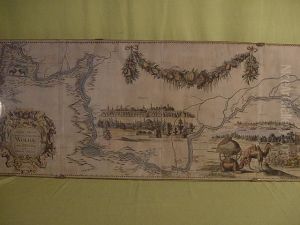Adam Olearius Paintings
Adam Olearius, whose birth name was Adam Ölschläger or Oehlschlaeger, was a German scholar, mathematician, geographer and librarian. Born on August 24, 1599, in Aschersleben, he is best known for his works as a diplomat and a travel writer, particularly for his detailed accounts of Russia and Persia during the 17th century.
Olearius studied at the University of Leipzig where he received a solid education in the liberal arts, philosophy, and languages. His scholarly pursuits led him to a career in diplomacy and exploration. In 1633, he joined the embassy of the Duke of Holstein, dispatched to the court of Shah Safi of Persia, with the aim of establishing a trade agreement. Olearius’s role during the expedition was that of the secretary, but his inquisitiveness and his prowess in observation made him a keen chronicler of the events and cultures he encountered.
Throughout his journey, Olearius meticulously documented the landscapes, political climates, and social customs of the regions he visited, which included Russia, Persia, and parts of Central Asia. His observations were later published in a comprehensive travelogue titled 'Offt begehrte Beschreibung Der Newen Orientalischen Reise', which translates to 'The New and Much Desired Description of the Oriental Journey'. This travelogue was widely regarded for its detailed descriptions and accurate information, and it was later translated into several languages, broadening its impact across Europe.
After his travels, Olearius became the librarian and the keeper of the Kunstkammer, a cabinet of curiosities, for the Duke of Schleswig-Holstein-Gottorp. He utilized his knowledge and experiences to amass a collection of artifacts and to manage the ducal library. This role also allowed him to continue his work as a geographer and cartographer, contributing to the geographical knowledge of the time.
Adam Olearius's contributions to the understanding of foreign cultures and geography made him an important figure in the world of 17th-century scholarship. His travel writings not only provided Europeans with a comprehensive look at distant lands but also helped to foster a spirit of curiosity and exploration during the Age of Enlightenment.
He passed away on February 22, 1671, in Gottorp, leaving behind a legacy as one of the early modern period's most notable travel writers and scholars. His works continue to be of historical significance, offering insights into the early modern perception of the wider world.
